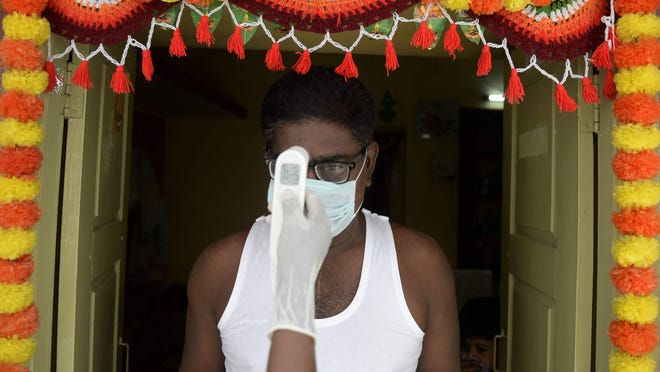

Both vaccination and prior infection help protect against new COVID-19 infections, but vaccination protects against hospitalization significantly more than natural immunity from prior infection alone, according to a study published Wednesday by the U.S. Centers for Disease Control and Prevention.Researchers analyzed the risk of COVID-19 infection and hospitalization among four groups of individuals: vaccinated with and without prior infection and unvaccinated with and without prior infection. The study case data from about 1.1 million cases in California and New York between the end of May and mid-November 2021. Hospitalization data was available from California only.Overall, COVID-19 case and hospitalization rates were highest among unvaccinated people who did not have a previous diagnosis.At first, those with a prior infection had higher case rates than those who were vaccinated with no history of prior infection. As the delta variant became predominant in the U.S. in later months, this shifted and people who survived a previous infection had lower case rates than those who were vaccinated alone, according to the study.Tracking the omicron surge Biden administration to give away 400 million N95 masks CDC moves 22 new destinations into its highest-risk level for travel due to omicron Government launches site for free COVID-19 tests Could omicron mark the end of COVID-19's pandemic phase? Here's what Fauci says When am I contagious if infected with omicron? "Experts first looked at previous infections confirmed with laboratory test by the spring of 2021, when the alpha variant was predominant across the country. Before the delta variant, COVID-19 vaccination resulted in better protection against a subsequent infection than surviving a previous infection. When looking at the summer and the fall of 2021, when delta became dominant in this country, however, surviving a previous infection now provided greater protection against subsequent infection than vaccination," Dr. Benjamin Silk, lead for CDC's surveillance and analytics on the Epi-Task Force, said on a call with media Wednesday.However, this shift coincides with a time of waning vaccine immunity in many people. The study did not factor the time from vaccination — and potential waning immunity — into the analysis. The study also does not capture the effect booster doses may have and was conducted before the emergence of the omicron variant.Throughout the period of the study, risk of COVID-19 hospitalization was significantly higher among unvaccinated people with no previous COVID-19 diagnosis than any other group."Together, the totality of the evidence suggests really that both vaccination and having survived COVID each provide protection against subsequent reinfection, infection and hospitalization," said Dr. Eli Rosenberg, New York State Deputy Director for Science. "Having COVID the first time carries with it significant risks, and becoming vaccinated and staying up-to-date with boosters really is the only safe choice for preventing COVID infection and severe disease."Experts also noted that characteristics of variants change, including how well they affect immunity from prior infections.The CDC said in a statement it will publish additional data on COVID-19 vaccines and boosters against the dominant omicron variant later this week.
Both vaccination and prior infection help protect against new COVID-19 infections, but vaccination protects against hospitalization significantly more than natural immunity from prior infection alone, according to a study published Wednesday by the U.S. Centers for Disease Control and Prevention.
Researchers analyzed the risk of COVID-19 infection and hospitalization among four groups of individuals: vaccinated with and without prior infection and unvaccinated with and without prior infection. The study case data from about 1.1 million cases in California and New York between the end of May and mid-November 2021. Hospitalization data was available from California only.
Overall, COVID-19 case and hospitalization rates were highest among unvaccinated people who did not have a previous diagnosis.
At first, those with a prior infection had higher case rates than those who were vaccinated with no history of prior infection. As the delta variant became predominant in the U.S. in later months, this shifted and people who survived a previous infection had lower case rates than those who were vaccinated alone, according to the study.
Tracking the omicron surge
"Experts first looked at previous infections confirmed with laboratory test by the spring of 2021, when the alpha variant was predominant across the country. Before the delta variant, COVID-19 vaccination resulted in better protection against a subsequent infection than surviving a previous infection. When looking at the summer and the fall of 2021, when delta became dominant in this country, however, surviving a previous infection now provided greater protection against subsequent infection than vaccination," Dr. Benjamin Silk, lead for CDC's surveillance and analytics on the Epi-Task Force, said on a call with media Wednesday.
However, this shift coincides with a time of waning vaccine immunity in many people. The study did not factor the time from vaccination — and potential waning immunity — into the analysis. The study also does not capture the effect booster doses may have and was conducted before the emergence of the omicron variant.
Throughout the period of the study, risk of COVID-19 hospitalization was significantly higher among unvaccinated people with no previous COVID-19 diagnosis than any other group.
"Together, the totality of the evidence suggests really that both vaccination and having survived COVID each provide protection against subsequent reinfection, infection and hospitalization," said Dr. Eli Rosenberg, New York State Deputy Director for Science. "Having COVID the first time carries with it significant risks, and becoming vaccinated and staying up-to-date with boosters really is the only safe choice for preventing COVID infection and severe disease."
Experts also noted that characteristics of variants change, including how well they affect immunity from prior infections.
The CDC said in a statement it will publish additional data on COVID-19 vaccines and boosters against the dominant omicron variant later this week.
Source link









